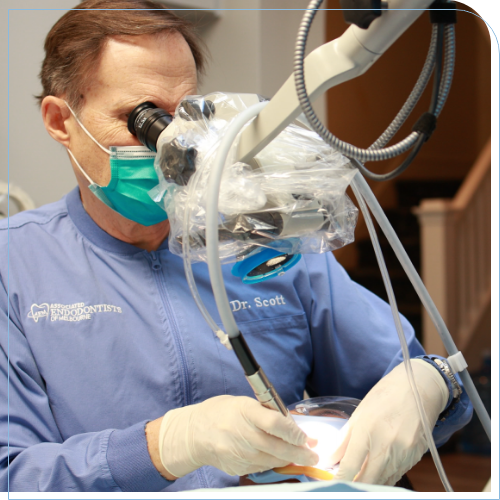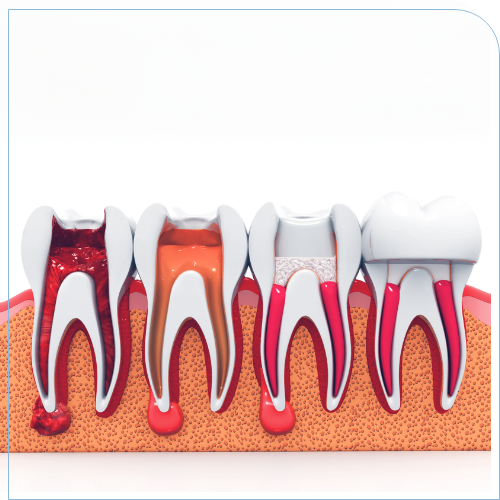Root Canal Treatment Melbourne
Comfortable, Effective Treatment for Damaged Teeth

Hearing that you need a root canal in Melbourne may come as a shock and seem like the worst news you could get about your smile. However, this procedure is more common than you may think and helps you preserve your natural grin. The American Association of Endodontists estimates that 25 million root canal procedures are performed each year, and 89% of those patients are satisfied after receiving treatment from an endodontist, like Dr. Paul Scott. Get the expert care you need and deserve in a luxurious, clean, and historic renovated dental office right here at Associated Endodontists of Melbourne.
Why Choose Associated Endodontists of Melbourne for Root Canal Treatment?
- GentleWave® Technology for Precision & Comfort
- We Accept & Maximize Dental Insurance
- Just 20 Minutes Away from Popular Cruise Ship Ports
Do I Need Root Canal Treatment?

Root canal treatment in Melbourne is used to treat teeth that have been severely damaged or otherwise compromised by inflammation and infection. The pulp, which is a collection of soft nerves and tissues located in the inner chamber of your tooth, can be overrun with bacteria, leading to a variety of symptoms, such as:
- A severe toothache.
- A pimple-like bump on the gums beneath the affected tooth.
- Heightened dental sensitivity to hot or cold drinks and foods.
- Inflamed or dark red gums near the affected tooth.
- Damage that has compromised the safety of the dental pulp (like a crack or chip).
The Root Canal Process

Each root canal begins with creating a small window in the top of a tooth. This allows Dr. Scott to remove the infected pulp and thoroughly clean the canals of the tooth’s root using our advanced GentleWave® technology and dental microscope. Once no bacteria linger, Dr. Scott will rebuild the structure of the tooth using a substance called gutta percha, and finally, top the treated tooth off with a durable, protective dental crown.
The Benefits of Getting a Root Canal

Dr. Paul Scott is an expert in root canal treatment and treating the inside of teeth. He has completed specialty training and earned his Certification in Endodontics at Northwestern University. With over 35,000 root canals completed throughout his career, his skill and experience helps patients immediately feel at-ease in the treatment chair. Among peace-of-mind, you’ll be able to also benefit from:
- A virtually painless procedure.
- Avoiding needing to replace a missing tooth.
- The ability to preserve your natural tooth.
- A more functional, comfortable smile.
Understanding the Cost of Root Canals

Root canal treatment can be an effective way to save a damaged tooth and relieve pain, but many patients worry that the cost will be prohibitive. At Associated Endodontists of Melbourne, we aim to make root canal treatment both accessible and transparent, helping you preserve your oral health without unnecessary stress. If you’re concerned about the cost of the procedure, read more below. You’ll see how different factors affect the cost and how our practice can make it more affordable.
Factors That Can Affect Root Canal Cost

The cost of a root canal can vary depending on:
- Tooth Location: Treating molars generally costs more than front teeth due to their complexity.
- Severity of Infection: A more severe infection may require additional care, which can increase costs.
- Pre-Treatment Needs: In some cases, a tooth may need further preparation, such as a buildup or crown. These procedures can add to the overall price.
Each case is unique, and our team will assess all these factors to provide a clear, personalized estimate before your treatment begins.
Is it Cheaper to Extract My Tooth?

While extracting a tooth may initially cost less than a root canal, it can actually lead to more expenses down the road. Extractions can leave gaps that cause other teeth to shift, potentially leading to misalignment and jaw pain.
Replacing an extracted tooth with a dental implant or bridge is often necessary to restore function, and this can often be costlier than a root canal. Another great reason to get a root canal is to preserve your natural tooth. This will provide a more affordable long-term solution and help you avoid the need for a prosthetic.
Does Dental Insurance Cover Root Canals?

Many dental insurance plans will cover root canal treatment, often around 50% of the procedure's cost. However, this varies based on your plan’s specifics, and deductibles may apply. If you’re unsure about the specifics of your coverage when it comes to root canals, our team can help you navigate your insurance benefits and clarify what part of the treatment may be covered.
Other Options for Making Root Canal Treatment Affordable

To help make root canal treatment more affordable, we offer a few excellent payment options:
- Cash Discount: A discount is available if you decide to pay for your treatment in cash up-front.
- Accepted Payment Methods: We also accept all major credit cards to provide flexibility in how you choose to cover your costs.
- CareCredit Financing: In addition, we proudly accept CareCredit, allowing patients to break the cost of their treatment into budget-friendly monthly payments.
We’re dedicated to helping you receive the care you need without financial strain. For more information on our payment options, contact our office to discuss how we can work with you to make your treatment as accessible as possible!
Root Canal FAQs
How Much Pain is Normal After a Root Canal?
Since your mouth will be numbed prior to the procedure, you won’t feel any pain or discomfort in the treatment chair. In fact, it’s likely that the numbing agent won’t subside until a few hours after you return home. At this point, you can take an OTC pain reliever, like ibuprofen, to keep soreness and sensitivity at bay. It’s also important that you avoid doing anything that could exacerbate your discomfort, like drinking hot beverages or eating spicy foods. Around the three-day mark, you should feel considerably better.
What Should I Do Before a Root Canal?
In the weeks leading up to your appointment, it’s important that you avoid drinking alcohol and using tobacco products. The night before, do your best to get plenty of rest (this will help you be less nervous and prevent your immune system from being impaired). The morning of, wear something comfortable and eat a healthy, well-balanced meal (unless you’re asked to fast because of the type of sedation dentistry you’re receiving).
What Happens if You Wait Too Long for a Root Canal?
Unfortunately, taking the “wait and see” approach will only allow the infection more time to progress. In fact, it may eventually “kill” the nerve and spread to the surrounding teeth and gums. That’s why it’s important to schedule a root canal, even if the situation doesn’t seem urgent. We want to remove the diseased tissue, alleviate your pain, and restore your healthy, happy smile before the tooth needs to be extracted.
Do Root Canals Make You Sick?
The myth that root canals make you sick continues to persist. However, the study that this misinformation stems from was conducted back in the 1920s, it was poorly designed, and it has been debunked several times over the years. So, you don’t have to worry – root canals won’t make you ill.
Important note: If you’ve heard something scary about root canals, like that they hurt or they can cause cancer, it’s crucial that you talk to your dentist! They can share helpful information and answer any questions you have so you have the facts you need to make an informed decision regarding your oral health.
Why Do I Need a Root Canal if My Tooth Doesn’t Hurt?
If you aren’t experiencing any pain, you might think that a root canal isn’t necessary. However, there are several warning signs of a badly decayed or infected tooth, including swollen gums, dark discoloration on the tooth, and persistent sensitivity. So, even if the situation may not seem urgent, it very well could be!
If you ever have any questions related to your oral health, like why you need a certain restorative treatment, don’t hesitate to talk to a helpful member of our team! We can provide you with the answers you need, ensuring you feel completely confident moving forward.
